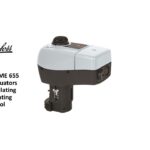AME 85, AME 86 Actuators For Modulating Control
Instructions
AME 85, AME 86

AME 85, AME 86 www.danfoss.com


Safety Note
To avoid injury of persons and damages to
the device, it is absolutely necessary to read
and observe these instructions carefully.
Necessary assembly, start-up, and
maintenance work must be performed by
qualified and authorized personnel only.
Prior to assembly and depressurizing the
system.
Please comply with the instructions of the
system manufacturer or system operator.
Mounting
Fix the AME 85, AME 86 on the valve. 1
Admissible Installation Positions. 2
Wiring 3
Control signal
Control signal from the controller must be
connected to terminals Y (input signal) and
SN (common) on the AME printed board.
Output signal
Output signal from the terminal X can be
used for indication of the current position.
Range depends on the DIP switch settings.
Supply voltage
Supply voltage
(24V~ -15 to +10%, 50 Hz) must be
connected to the terminals SN and SP.
Dimensions 4
DIP switch settings 5
Factory settings:
ALL switches are on OFF position! 1
Note:
All combinations of DIP switches are
allowed. All functions that are selected are
added consecutively. There is only one logic
override of functionalities i.e. the switch No.6
Proportional / 3 point, which sets actuator to
ignore control signal and works as a “simple”
3-point actuator.
SW1: U/I
Actuator can responde to a voltage or
current control signal. With switch No.1: U/I
actuator can be set either to operate with
a voltage control signal (actuator responds
to signal between 0…10V), or current
control signal (actuator responds to signal
between 0…20mA).
Factory setting:
voltage control signal (0 … 10 V).
SW2: 2V … 10 / 0V … 10
Actuator can be set to response on a
control signal from 2V, or 0V. If the actuator
is set to current signal than it responds to
control signal from 4mA or 0mA.
Factory setting is:
2 … 10V.
SW3: Direct/Inverse
Actuator can be set for spindle to travel
downwards on rising control signal
(DIRECT), OR for spindle to travel upwards
on rising control signal (INVERSE)
Factory setting is:
DIRECT
SW4: —/Sequential
Two actuators can be set to work parallel
with one control signal. If the SEQUENTIAL
is set than an actuator responds to split
control signal (see 0(2)V…5(6V) / 6(6)
V…10V).
Note:
This combination works in combination with
switch No.5: 0(2)V…5(6V) / 6(6)V…10V.
SW5: 0(2) V … 5(6 V)/6(6) V … 10 V
Note:
This function is available if switch No.4:
— / Sequential is set.
Actuator can be set to match the range of the
control signal:
2 … 6 V (switch No.2: 2 V … 10)
0 … 5 V (switch No.2: 0 V … 10)
4 … 12 mA (switch No.2: 2 V … 10)
0 … 10 mA (switch No.2: 0 … 10)
OR
6 … 10 V (switch No.2: 2 V … 10)
5 … 10 V (switch No.2: 0 V … 10)
12 … 20 mA (switch No.2: 2 V … 10)
10 … 20 mA (switch No.2: 0 … 10)
SW6: Proportional/3 point
Actuator can operate as “simple” 3-point
actuator, if the 3-point function is selected.
Power supply should be connected on
SN and SP ports. On port 1 or 3 24VAC
signal is connected for rising or lowering
of actuator. Return signal X indicates the
correct position.
Note:
if 3-point function is selected actuator does
not respond to any control signal on port Y.
It only rises and lowers spindle if power is
supplied on port 1 or 3.
SW7: LOG. flow/LIN. flow
Almost all Danfoss valves that fit the
actuator have logarithmic (equal
percentage) flow/position characteristic.
With setting switch to LIN. flow the
characteristic of motorised valve can be
affected. Combination of actuator and
valve can work together as valve with
LINEAR characteristic.
Factory setting is:
LOG. Flow (characteristic of valve is unchanged)
Note:
If this function is used in combination with
non-logarithmic valves the characteristic
of motorised valve will be anti-logarithm of
valve’s characteristic (e.g. valve with linear
characteristic will be transformed to quick
open characteristic).
SW8: 100% KVS/RED. KVS
Actuator can be set to reduce KVS value of
a valve. With setting RED. KVS the maximal
flow through the valve is reduced for
half increment toward the next smaller
standard KVS value with logarithmic
characteristic (e.g: standard valve with
KVS 16 and function RED. KVS causes that
motorised valve to work as the valve with
KVS13 (half-way between KVS10 and KVS16).
Note:
This function works proper only with
logarithmic (equal percentage) valves.
SW9: Reset
After the actuator has been connected to
power supply, the actuator will start the
self-adjustment procedure. The indicator
LED flashes until self-adjustment is finished.
The duration depends on the spindle travel
and will normally last a few minutes. The
stroke length of the valve is stored in the
memory after self-adjustment has been
completed. To restart self-adjustment,
change the position of RESET switch
(switch No.9). If the supply voltage is
switched off or falls below 80% in more
than 0.1 s, the current valve position will be
stored in the memory and all data remain
saved in the memory also after a power
supply cut-out.
Function test
The indicator light shows whether the
positioner is in operation or not. Moreover,
the indicator shows the control status and
faults.
Constant light
– normal operation
No light
– no operation or no power supply
Intermittent light (1 Hz)
– self adjusting-mode
Intermittent light (3 Hz):
– power supply too low
– insufficient valve stroke (<20 s)
– end-position cannot be reached.
Danfoss can accept no responsibility for possible errors in catalogues, brochures and other printed material. Danfoss reserves the right to alter its products without notice. This also applies to Products already on order provided that Such alterations can be made without subsequential changes being necessary in speciation’s already agreed, All trademarks in this material are property of the respective companies. Danfoss and the Danfoss logotype are trademarks of Danfoss A/S. All rights reserved.
Documents / Resources
 |
Danfoss AME 85,AME 86 Actuators For Modulating Control [pdf] Instructions AME 85, AME 86, AME 85 AME 86 Actuators For Modulating Control, AME 85 AME 86, Actuators For Modulating Control, For Modulating Control, Modulating Control |



